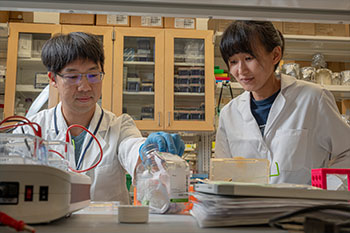A Simple Approach to Complex Discoveries in Metastasis: Dr. Ming Chen

Ming Chen, PhD, is leading groundbreaking research to reshape our understanding of cancer biology.
He joined the department in 2018, and one of his primary areas of focus includes unraveling the mechanisms of metastasis, or how cancer spreads from one organ or tissue to another. Metastasis contributes to over 90% of cancer-related deaths, and Chen has developed several innovative mouse models to study both genetic and cellular drivers behind metastatic prostate cancer.

“My goal is to continue to employ global and integrative analysis approaches to unveil the pivotal events driving metastatic prostate cancer. I aim to spearhead the development of life-saving cancer treatments, ultimately enhancing the well-being of patients and their families who currently bear the burden of this lethal disease,” Chen affirmed.
Through these animal models, Chen and his colleagues discovered that the RB1 gene deficiency in aggressive prostate cancer makes it susceptible to ferroptosis, a type of iron-dependent cell death. Chen’s team used a ferroptosis-inducing drug called JKE-1647 and found it to reduce cancer growth and improve survival in mice, suggesting a promising targeted therapy for advanced prostate cancer.
“I’m grateful and feel privileged to be part of an exceptional department that offers crucial administration, valuable resources, and impactful mentorship, which contribute significantly to both my professional endeavors and the growth of our trainees,” Chen reflected.
Notable Honors and Accomplishments:
- Multiple NIH RO1 grants
- Borden Scholars Award
- Mark Slive Foundation grant
- Idea Development Award from the DoD Prostate Cancer Research Program
- Publication of his lab’s research titled “RB1-deficient prostate tumor growth and metastasis are vulnerable to ferroptosis induction via the E2F/ACSL4 axis” in the Journal of Clinical Investigation
- Mu-En Wang, PhD, a postdoctoral fellow in Chen’s lab, received a Department of Defense (DoD) Prostate Cancer Research Program (PCRP) Early Investigator Research Award